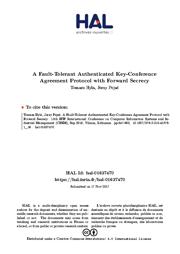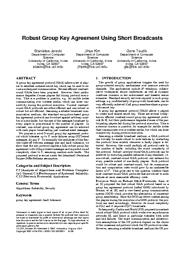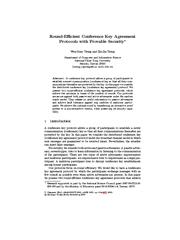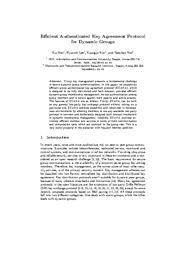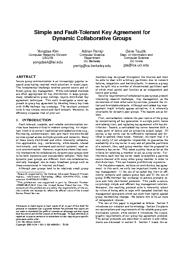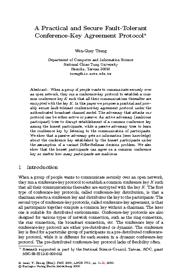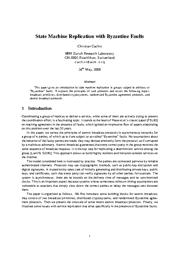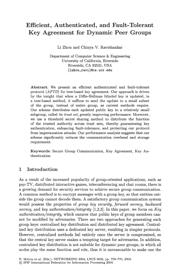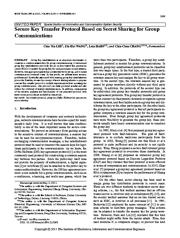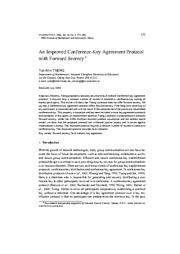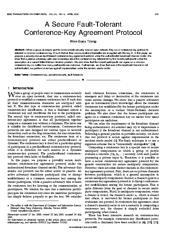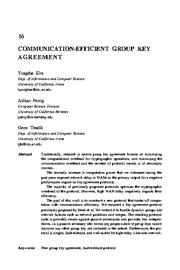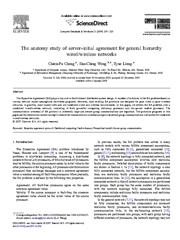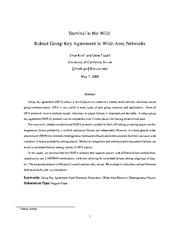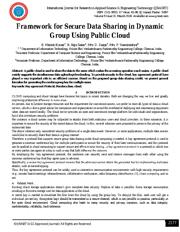A copy of this work was available on the public web and has been preserved in the Wayback Machine. The capture dates from 2019; you can also visit the original URL.
The file type is application/pdf.
Filters
A Fault-Tolerant Authenticated Key-Conference Agreement Protocol with Forward Secrecy
[chapter]
2016
Lecture Notes in Computer Science
In this paper, we introduce a special type of group authentication using secret sharing, which provides an efficient way to authenticate multiple users belonging to the same group without the chairman. ...
Unlike most user authentication protocols that authenticate a single user each time, our proposed protocol authenticates all users of a group at once. ...
The protocol is a provable secure conference-key agreement protocol with fault tolerance and forward secrecy. ...
doi:10.1007/978-3-319-45378-1_56
fatcat:tvtz3p6ukfgd7aurxgwzwfdble
Robust group key agreement using short broadcasts
2007
Proceedings of the 14th ACM conference on Computer and communications security - CCS '07
We propose a novel 2-round group key agreement protocol which tolerates up to T node failures using O(T )-sized messages, for any T . ...
To exemplify the usefulness of this flexible trade-off between message size and fault tolerance, we show that the new protocol implies a fully-robust group key agreement with O(log n)-sized messages and ...
Note that there are standard and inexpensive compilation techniques which convert any group key agreement protocol into an authenticated group key agreement by (1) deriving a unique session-specific nonce ...
doi:10.1145/1315245.1315296
dblp:conf/ccs/JareckiKT07
fatcat:4ox6tg7vazbxles5aounlb3qqa
Round-Efficient Conference Key Agreement Protocols with Provable Security
[chapter]
2000
Lecture Notes in Computer Science
We present two round-efficient conference key agreement protocols, which achieve the optimum in terms of the number of rounds. ...
In this paper we consider the distributed conference key (conference key agreement) protocol. ...
However, both protocols cannot withstand the attack of malicious participants. The fault-tolerant conference key agreement protocol of Klein et al. ...
doi:10.1007/3-540-44448-3_47
fatcat:yykf5mz3k5ba3fchhhvvzjkg4m
Efficient Authenticated Key Agreement Protocol for Dynamic Groups
[chapter]
2005
Lecture Notes in Computer Science
In this paper, we propose an efficient group authenticated key agreement protocol (EGAKA), which is designed to be fully distributed and fault-tolerant, provides efficient dynamic group membership management ...
EGAKA achieves scalability and robustness in heterogenous environments by allowing members to use any available two-party protocol in common and deliberately designed fault-tolerant mechanism in dynamic ...
EGAKA-KU In order to accommodate frequently group membership changing, key agreement protocol in dynamic groups should be flexible and fault-tolerant, and provide efficient group re-keying process. ...
doi:10.1007/978-3-540-31815-6_13
fatcat:lvxk3b6gurhhpcmhvj6b66slhy
Simple and fault-tolerant key agreement for dynamic collaborative groups
2000
Proceedings of the 7th ACM conference on Computer and communications security - CCS '00
This work investigates a novel approach to group key agreement by blending binary key trees with Diffie-Hellman key exchange. The resultant protocol suite is very simple, secure and fault-tolerant. ...
The fundamental challenge revolves around secure and efficient group key management. ...
An implementation of any distributed fault-tolerant group key agreement protocol requires VS. ...
doi:10.1145/352600.352638
dblp:conf/ccs/KimPT00
fatcat:gxtgjgfds5d7ffoqecor2yarwa
A Practical and Secure Fault-Tolerant Conference-Key Agreement Protocol
[chapter]
2000
Lecture Notes in Computer Science
In this paper we propose a practical and provably secure fault-tolerant conference-key agreement protocol under the authenticated broadcast channel model. ...
When a group of people wants to communicate securely over an open network, they run a conference-key protocol to establish a common conference key K such that all their communications thereafter are encrypted ...
[15] proposed a fault-tolerant conference-key agreement protocol. However, the protocol is quite inefficient and its security is not rigidly proved. ...
doi:10.1007/978-3-540-46588-1_1
fatcat:vyvbyyyr55fq3ph5a2r3axr5du
State Machine Replication with Byzantine Faults
[chapter]
2010
Lecture Notes in Computer Science
This paper gives an introduction to state machine replication in groups subject to arbitrary or "Byzantine" faults. ...
It explains the principles of such protocols and covers the following topics: broadcast primitives, distributed cryptosystems, randomized Byzantine agreement protocols, and atomic broadcast protocols. ...
BFT is actually a Byzantine-fault-tolerant version of the Paxos protocol [Lam98, Lam01a, Lam01b] . ...
doi:10.1007/978-3-642-11294-2_9
fatcat:ipbwcimym5h55m5z3r2r3hhtzi
Efficient, Authenticated, and Fault-Tolerant Key Agreement for Dynamic Peer Groups
[chapter]
2004
Lecture Notes in Computer Science
We present an efficient authenticated and fault-tolerant protocol (AFTD) for tree-based key agreement. ...
Moreover, we use a threshold secret sharing method to distribute the function of the trusted authority across trust sets, thereby guaranteeing key authentication, enhancing fault-tolerance, and protecting ...
., and the Fault-Tolerant Networks program of Defense Advanced Research Projects Agency, under contract F30602-01-2-0536. ...
doi:10.1007/978-3-540-24693-0_62
fatcat:s2zmvugihzfllni4s3qecd2vci
Secure Key Transfer Protocol Based on Secret Sharing for Group Communications
2011
IEICE transactions on information and systems
However, the DH key agreement protocol is not suitable for a group communication, such as an e-conference, e-learning, and multi-user games, which has Manuscript ...
Conventional group key establishment protocols use an on-line trusted key generation center (KGC) to transfer the group key for each participant in each session. ...
[4] first proposed group key agreement protocol with fault-tolerance. The goal of faulttolerance is to exclude malicious participants from the group. ...
doi:10.1587/transinf.e94.d.2069
fatcat:qarnqup5dbb53fvdgp6cv425ca
An Improved Conference-Key Agreement Protocol with Forward Secrecy
2005
Informatica
Recently, Tzeng proposed a provably secure and fault-tolerant conference-key agreement protocol. ...
The improved protocol requires a constant number of rounds to compute a conference key. The improved protocol provides fault-tolerance. ...
A secure fault-tolerant conference-key agreement protocol. IEEE Trans. on Computers, 51(4), 373-379. Tzeng, W.G. (2002). Corrections to: a secure fault-tolerant conference-key agreement protocol. ...
doi:10.15388/informatica.2005.098
fatcat:bswzybpduvel7lmt6utpeq4yua
A secure fault-tolerant conference-key agreement protocol
2002
IEEE transactions on computers
In this paper, we propose a provably secure fault-tolerant conference-key agreement protocol under the authenticated broadcast channel model. ...
AbstractÐWhen a group of people want to communicate securely over an open network, they run a conference-key protocol to establish a common conference key K such that all their communications thereafter ...
[17] proposed a fault-tolerant conference-key agreement protocol. However, the protocol is quite inefficient and its security is not rigidly proven. ...
doi:10.1109/12.995447
fatcat:vy726yehu5bt3obqmggncg64v4
Communication-Efficient Group Key Agreement
[chapter]
2001
IFIP Advances in Information and Communication Technology
Peer group key agreement, fault-tolerant protocol Keywords: 230 Part Six Secure Group Communications 1. ...
Furthermore, the protocol is simple, fault-tolerant, and well-suited for high-delay wide area network. ...
of fault-tolerance, scalability, and reliability). ...
doi:10.1007/0-306-46998-7_16
fatcat:sgoj2gfbufehbgqmhvsqs4qiha
The anatomy study of server-initial agreement for general hierarchy wired/wireless networks
2009
Computer Standards & Interfaces
The Byzantine Agreement (BA) plays a key role in fault-tolerant distributed system design. A number of solutions to the BA problem based on various network model assumptions have been proposed. ...
The communication overhead of BA protocol is inherently large and secure group communications are important. ...
BA protocols have been proposed to ensure the reliability and fault-tolerance in different network models. Table 1 shows a comparison of various protocols over different network models. ...
doi:10.1016/j.csi.2007.12.004
fatcat:fahj5pquofcovdhfbl6ho2ym7m
Survival in the Wild: Robust Group Key Agreement in Wide-Area Networks
[chapter]
2009
Lecture Notes in Computer Science
A robust group key agreement (RGKA) protocol runs to completion even if some players fail during protocol execution. ...
Group key agreement (GKA) allows a set of players to establish a shared secret and thus bootstrap secure group communication. ...
In contrast, contributory group key agreement requires every group member to contribute an equal share to the common group secret, computed as a function of all members' contributions. ...
doi:10.1007/978-3-642-00730-9_5
fatcat:jlqszzob5vgglauy27cbiftfna
Framework for Secure Data Sharing in Dynamic Group Using Public Cloud
2018
International Journal for Research in Applied Science and Engineering Technology
To provide security to the cloud, key agreement protocol have played a very important role in an efficient manner. ...
Based on the proposed group data sharing model, we present general formulas for generating the random group key for multiple users. ...
to support secure and efficient data sharing., a key agreement protocol is a protocol in which two or more parties can agree on a key in such a way that both Influence the outcome. ...
doi:10.22214/ijraset.2018.3510
fatcat:hb7uioyyazcg5kfgspj36essga
« Previous
Showing results 1 — 15 out of 16,426 results

